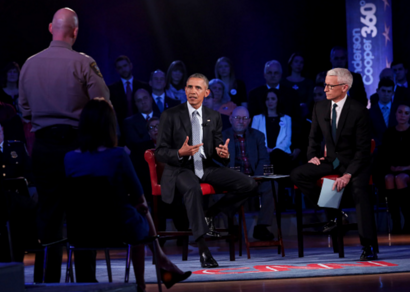In Rhode Island, a new third party, the Moderate Party of Rhode Island, hopes to challenge Democratic Party dominance with a message of fiscal conservatism and pragmatic policymaking. In a region long seen as bastion of liberalism, with only token opposition representation in the legislature, can it be successful in reigniting and shaping political debate within the state and throughout New England?
The election of Senator Scott Brown has seemingly reinvigorated a dying Republican Party in New England. Unable to sway the area’s traditionally socially liberal voters, Republicans had been losing seats in the region’s congressional delegation and state legislatures with no end in sight. Now, with the unlikely triumph of Brown in the Senate special election, many Republicans in Massachusetts and across New England are hopeful that this victory signaled the beginning of a resurgence in support of Republican principles.
However, it remains to be seen whether Brown’s victory provided a model that other candidates could follow to defeat the entrenched Democratic establishment, or whether it was a unique case that cannot be replicated. If future candidates seek to emulate Brown’s success, they will likely need to do so by codifying his ideas and proposals into a clear and comprehensive political platform.
This may be easier said than done. It is no secret that the Republican Party has had difficulty in recent months coalescing around a set of common policy goals. Perhaps the best example of the GOP’s internal struggles was found in the 2009 special election for the U.S. House of Representatives seat in New York’s 23rd Congressional District. This off-year election garnered national attention following the decisions of several prominent Republican politicians, including Sarah Palin, Tim Pawlenty, and Fred Thompson to endorse Conservative Party candidate Doug Hoffman rather than Republican candidate Dede Scozzafava. Scozzafava holds moderate-to-liberal views on issues such as abortion and gay marriage, though many of her other positions would put her to the right of most Democrats in New York. Ultimately, Scozzafava withdrew from the race and Democrat Bill Owens emerged the victor, with 49 percent of the vote to Hoffman’s 46 percent.
In Massachusetts, former Harvard Pilgrim CEO Charlie Baker and convenience store magnate Christy Mihos are vying for the Republican nomination for governor in 2010, while state Treasurer and Democrat-turned-Independent Tim Cahill also prepares to mount a run against a seemingly vulnerable Deval Patrick. All three of these candidates tout their fiscal conservative bona fides, while defending their more liberal positions on social issues, a formula that has worked well for Massachusetts Republicans in the past. However, even if one of these candidates does manage to unseat Patrick, who continues to cling to single-digit leads in recent polls, it is still uncertain whether such a victory, even in combination with Brown’s election, would translate into any sort of larger and sustainable challenge to the dominance of the Democratic Party in New England. The influence of “Rockefeller Republicans” in the region, a term used in reference to the moderate politics of former Vice President and New York governor Nelson Rockefeller in the 1960s and 1970s, seems to be a relic of a bygone era, overshadowed by the dominance of the conservative base in national Republican politics.
In Rhode Island, where Democrats hold a legislative supermajority similar to that in Massachusetts, a unique challenge has been made to single-party dominance. This past summer, a group of activists led by Barrington software engineer Ken Block gathered enough signatures to place a third party on the statewide ballot. Known as the Moderate Party, its platform focuses on four principal issues: economy, ethics, education, and environment. The Party takes no official stance on social issues, arguing that such issues are of secondary importance to the revitalization of the state’s economy. In a state with double-digit unemployment that was ranked last by Forbes magazine in term of its favorability towards business, voters will be eager to hear from candidates who seek to challenge the status quo, particularly on economic issues.
That the Moderate Party was able to achieve official status on the ballot is no small feat, as Block and other Moderate Party members needed to gather the signatures of at least 5% of the votes cast in the last gubernatorial or presidential election, or in this case 23,589 signatures. In addition, the Moderate Party had to overcome legal obstacles just to begin the signature drive, which it accomplished with the help of a favorable court ruling in May 2009. Since receiving official recognition in August, the Party has continued to build momentum and fundraise, and now has nearly as much in its campaign coffers as the state GOP.
However, the Moderate Party’s inchoate stage has not seen all smooth sailing. At the end of November, the State Board of Elections began investigating Block’s recent donations to the Moderate Party, which it said violated campaign finance laws limiting the amount that one individual may contribute to party-building efforts. Block later admitted that his actions violated state law and agreed to a $2,000 fine. This incident may spell trouble for a party that has made ethics reform a key component of its platform. On the other hand, this conflict with the Board of Elections may offer the Moderate Party another opportunity to position itself in opposition to the state’s current political establishment.
The Moderate Party has also met with difficulty in its quest to recruit a candidate for governor, though it says it will announce a gubernatorial candidate along with other 2010 legislative candidates on February 21st. One obstacle it faces is the fact that former Republican U.S. Senator Lincoln Chafee, who holds socially liberal and fiscally moderate positions, has launched a campaign for governor as an Independent and is currently leading polls for the 2010 election. While Chafee’s platform may be in line with that of the Moderate Party, his personal wealth will allow him to make a gubernatorial run without the backing of any political party. It is unlikely that Chafee would want to tie his political fortunes to those of a new and untested political entity if he can run a successful campaign on his own.
Despite these challenges, the Moderate Party may still be a force to be reckoned with in the 2010 election, especially in legislative races. The success of the Moderate Party thus far may indicate that the time is right in Rhode Island for the emergence of a new opposition party.
A serious effort by the Moderate Party may establish a model for the Republican Party to follow as it continues to refine its message and reestablish itself as a party with national appeal. By rejecting the dominance of controversial social issues in its platform, and bringing to the foreground of the political discussion a philosophy of fiscal conservatism as well as a focus on other important issues such as education and the environment, the Moderate Party seeks to build a viable opposition party that will appeal in a region that is often socially liberal.
Republican Party leaders may not wish to replicate this practice exactly, but by embracing those individuals who are dissatisfied with the Democratic Party but hold more moderate views than the conservative base, they may find an alternative that is more desirable than letting the party collapse completely in New England. The Republican Party does not necessarily need to abandon its positions on social issues to be competitive in Rhode Island, or New England. Instead the emergence of the Moderate Party should be a seen as a sign to Republicans that focusing their platform so heavily on divisive issues is likely to continue to alienate moderates in the Northeast.
____________________________________
“2009 Election Results.” New York Times. http://elections.nytimes.com/2009/results/other.html (accessed 5 February 2010).
“2010 Massachusetts Governor: Challengers Gain on Incumbent Patrick.” Rasmussen Reports. http://www.rasmussenreports.com/public_content/politics/elections2/election_2010/election_2010_governor_elections/massachusetts/election_2010_massachusetts_governor (accessed 5 February 2010).
Encyclopedia Britannica’s Guide to American President s.v. “Nelson Aldrich Rockefeller.” http://www.britannica.com/presidents/article-9063986 (accessed 5 February 2010).
Moderate Party of Rhode Island. “Moderate Party of Rhode Island.” http://www.moderate-ri.org/(accessed 5 February 2010).
Moore, Russell J. “Moderate Party’s fundraising equals GOP’s.” Warwick Beacon, November 5, 2009. http://www.warwickonline.com/printer_friendly/4340527 (accessed 5 February 2010).
“New RI political party agrees to $2,000 fine.” The Boston Globe,D December 30, 2009. http://www.boston.com/news/local/rhode_island/articles/2009/12/30/new_ri_political_party_agrees_to_2000_fine/?rss_id=Boston.com+–+Rhode+Island+news (accessed 5 February 2010).
Peoples, Steve. “State to Moderates: Pay $20,000 penalty for fundraising.” Projo 7 to 7 News Blog, November 23, 2009. http://newsblog.projo.com/2009/11/providence—-the-state-board.html(accessed 5 February 2010)



